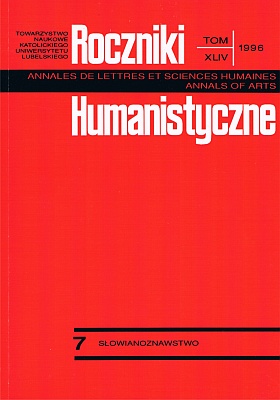Rzeczywistość łagrowa w twórczości Vadima Delaunay'a Sacrum w kręgu profanum
Abstrakt
Vadim Delaunay was not an ordinary man and artist. His poetry and prose became the evidence of his „Gulag consciousness”. The existence in no-time, which were the years spent in the Gulag camp(s), brought forth the need to look towards God. The Creator, according to the writer, was the only help he could always rely on. Therefore, the category of sacrum with regard to the prose and poetry of V. Delaunay becomes a most motivated category.
The aim of the article was to find, apart from the most important sacrum in the work of V. Delaunay – the Christian sacrum, another sacrum which can be understood as a reality common for all religions. The proof of existence of such a sacrum are manyfold biblical and religious elements which are so often present in the prose and poetry of the Gulag writer.
The following motives are most noticeable: good and evil, hell and heaven, bell and others. Very often V. Delaunay refers to the motive of the Passion and Pharisee trial of Christ.
Apart from that, we can find in his poetry contemplation about his own existence based on the analogy between the life of the Saviour and the fate of the „chosen” poet (Lord's Anointed).
A very important part in the work of V. Delaunay is the problem of faith and hope. It was very important because the prisoner-poet knew like nobody else how difficult it was to be a believer in the camp and how easy it was to lose faith. The double view of the camp is connected with this problem – as both a cursed and sacred place (sacrum and profanum).
Together with the attempt to reflect on the existential questions (problem of life and death) we also tried to show a specific evolution of the poet, with a special stress on the year 1975 (emigration).
The stay abroad, loss of hope to come back home, the imprisoument of his wife finally resulted in his not waking up in his flat in Paris. The question is how many similar to him were born in captive Russia.
Copyright (c) 1996 Roczniki Humanistyczne

Utwór dostępny jest na licencji Creative Commons Uznanie autorstwa – Użycie niekomercyjne – Bez utworów zależnych 4.0 Międzynarodowe.





